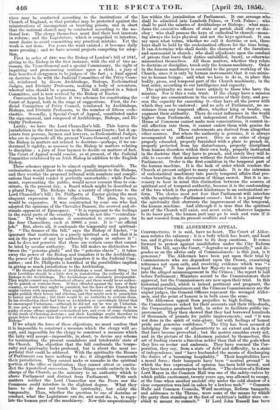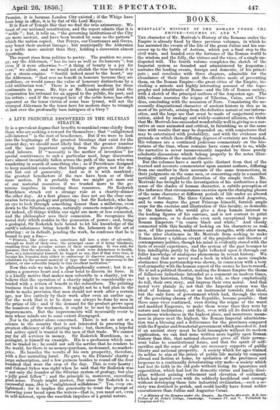THE ALDERMEN'S APPEAL.
CORPORATIONS; it is said, have no heart. The Court of Alder- men refutes the calumny ; it is a body which has heart, and head too, and it gives eloquent voice to its deep emotions; It-comes forward to protest against annihilation under the City Reform Bill. The bill, saysthe Court, " degrades us personally," and.cle- grades us on the advice only of Commissioners : is this just, is it generous? The Aldermen have been put uppoon their trial by Commissioners who are ,dependent upon the wn, examining witnesses not upon oath, and receiving evidence which was " a legal sham." It has pleased her Majesty to appoint an inquiry into the alleged-mismanagement in the Crimea ; the report is laid before-Parliament ; Ministers accord to the Commissioners their approval, but the Commissioners are now upon their trial. In this historical parallel, which is indeed pertinent and pregnant, the Corporation Commissioners and the Crimean Commissioners are the unjust judges, the General Officers represent the wronged Alder- men, and the point of honour is in both cases the same. The Aldermen appeal from prejudice to high feeling. When the Commissioners asked for their accounts and their tatle-deeds,,. the Corporation produced both, in order to facilitate public im- provement. They then showed that they had borrowed hundreds of thousands of pounds for public improvements ; and " it was not done in the spirit of vain-glory, but with feelings of 'honest pride and generous confidence." The City has been accused of. indulging the organ of alimentivity to an extent and in a style that have become proverbial ; but the motive ennobles every act, and in the picture of the Aldermen painted by themselves, this art of feeding rises to a function nobler than that of the gods when they live on nectar and ambrosia. They have rescued the. Cor- poration, they say, from a state of debt and difficulty, to a state- of independence, and " have husbanded the means of discharging the duties of a becoming hospitality." Their hospitalities have a moral force ; their banquets have been " neutral ground" in_ which- the free expression of opinion has been held sacred, and theyhave been a counterpoise to faction. " The election of a. Reform - Lord Mayor in the Common Hall was one of the safety--valves by which public excitement, twenty years ago, was allowed to escape; at the time when another ancient city under the cold shadow of a close corporation.waslaidin ashes by a lawless mob." " Common • Halls and Common Councils, Ward meetings, Reform banquets, and addresses to the Throne, were some of the -means by which the party then standing at the foot of ambition's ladder were en- abled to mount its-summit," If Lord John Russell has been
Premier, it is because London City existed ; if the Whigs have been long in office, it is by fiat of the Lord Mayor. It is East of Temple Bar that we find the true aristocracy. We boast of our national constitution, and the report admits that it is n noble " ; but, it tells us, " the governing institutions of the City are more ancient, and have been treated by some as the pattern" which the nation copied. Our Percys, our Courtenays and Greys, may boast their ancient lineage ; but municipally the Alderman is a noble more ancient than they, holding a succession almost Apostolic.
The report rises from politics to poetry. The position we occu- py, say. the Aldermen, " has its uses as well as its honours "; but even if it were otherwise F.—" A thing of beauty is a joy for ever," we allow, and we would not abolish the rose because it is not a steam-engine. " Sordid indeed must be the heart," say the Aldermen, " that sees no benefit in honours because they are profitless, or would assess the value of honorary distinctions by a cold: utilitarian test." There is no sufficient medium for these sentiments in prose. Mr. Gye or Mr. Lumley should lend the Corporation his tribunal for an appeal to the public, his poet, and his artists : and if the wronged heir of the noble house has often appeared as the tenor victim of some bass tyrant, will not the wronged Alderman be the tenor hero for modern days to triumph at last over the profoundly bass intrigues of a Grey



























 Previous page
Previous page